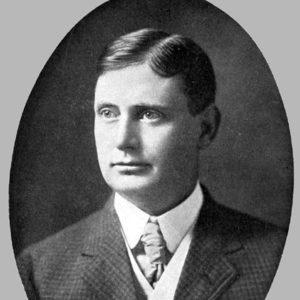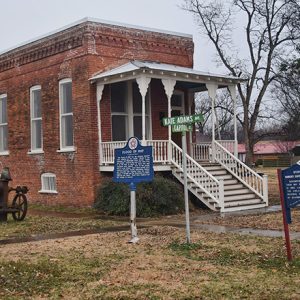calsfoundation@cals.org
Xenophon Overton Pindall (1873–1935)
Xenaphon Overton Pindall—attorney, Mason, civic leader, Democrat, and legislator—served as acting governor of Arkansas from May 14, 1907, until January 11, 1909. Rising to the position through an improbable series of circumstances, Pindall focused on the administrative detail of the office and used the power of appointment to shape the policies of state government.
X. O. Pindall was born on August 21, 1873, in Monroe County, Missouri, to Colonel Lebbeus A. and Elnorah Snell Pindall. His father was an attorney and later served in the Arkansas legislature. His mother was from a prominent Missouri family. He had three brothers, two of whom died in infancy and one who died at the age of sixteen.
During the Civil War, Pindall’s father served the Confederate cause in Arkansas, eventually commanding the Ninth Missouri Battalion of Sharpshooters. During Reconstruction, his father moved the family to Desha County, Arkansas. Pindall attended public schools in Desha County and later attended Missouri Military Academy in Mexico, Missouri, and Central College in Fayette, Missouri. Returning to Arkansas, he studied law at what would later become the University of Arkansas at Little Rock (UA Little Rock), graduating in 1896. He practiced law in Arkansas City (Desha County) and served as an assistant prosecuting attorney. His law office is listed on the National Register of Historic Places.
On December 15, 1902, Pindall married Mae Quilling, the daughter of a prominent Desha County farmer and merchant. There is no evidence that they had children.
In 1902 and 1904, Pindall was elected to the Arkansas House of Representatives from Desha County. In 1906, despite having won the popular vote, he was defeated by William F. Kirby for the Democratic nomination for attorney general in a close vote by delegates of the Democratic State Convention. Despite the urging of his supporters, he declined to contest the nomination.
Pindall was elected to represent Desha and Drew counties in the Arkansas Senate in 1907 in a special election held to fill the vacancy left by the death of Senator Howard Robb. As the legislative session of 1907 ended, Pindall was elected president pro tempore of the Senate, and consequently acting governor, by his Senate colleagues. His selection resulted in his succeeding President Pro Tempore and Acting Governor John I. Moore, who had become acting governor upon the incapacity of Governor John S. Little.
In 1908, the settlement of Kilborn in Searcy County changed its name to Pindall (Searcy County) in honor of the acting governor; it was incorporated as a town in 1912.
Much of Pindall’s service as acting governor dealt with the administrative detail of the office such as pardons, commutations, extradition issues, appointments, and proclamations. Major issues during his tenure were the state penitentiary system and the convict lease program. While acting governor, Pindall served as a member of the State Penitentiary Board, made numerous visits to the convict farms, and authorized an investigation and report of conditions. His actions are credited with starting a chain of events that brought about the abolition of the convict lease system some years later. Tension and controversy also surrounded the State Charitable Institutions Board of Trustees and the St. Francis Levee Board, particularly as appointments shifted board allegiances from former Governor Jeff Davis.
Pindall was frequently and bitterly at odds with the Senator Jeff Davis and Attorney General Kirby faction of the Democratic Party, and there were occasional rumors of Kirby bringing proceedings to remove Pindall from office, although that never occurred.
The deteriorating state financial condition and a capitol construction project beset by controversy brought requests to call a special session of the legislature on several occasions, although Pindall declined to do so. While attending a conference out of state in 1908, Speaker of the House Allen Hamiter, as acting governor, called a special session, causing Pindall to race back to Arkansas and revoke the call.
After his tenure as acting governor, Pindall continued to serve as state senator until 1911. Thereafter, he lived in Little Rock (Pulaski County), maintaining a law practice there and in Arkansas City, and continued to be somewhat active in civic affairs as well.
Pindall died in Little Rock on January 2, 1935, as the result of a fall from a bluff near the Arkansas River. Striking his head on some rocks, he fell into a pool of boiling water coming from the steam exhaust drain of a utility company. Pindall was buried in Little Rock’s Roselawn Memorial Park on January 4, 1935.
For additional information:
Donovan, Timothy P., Willard B. Gatewood Jr., and Jeannie M. Whayne, eds. The Governors of Arkansas: Essays in Political Biography. 2nd ed. Fayetteville: University of Arkansas Press, 1995.
Merritt, Jim. “X. O. Pindall: Desha County’s First and Only Governor.” Programs of Desha County Historical Society 4 (Spring 1978): 14–21.
Wes Goodner
Little Rock, Arkansas
 Early Twentieth Century, 1901 through 1940
Early Twentieth Century, 1901 through 1940 Politics and Government
Politics and Government X. O. Pindall
X. O. Pindall  Markers at Xenophon Overton Pindall Law Office
Markers at Xenophon Overton Pindall Law Office 




Comments
No comments on this entry yet.